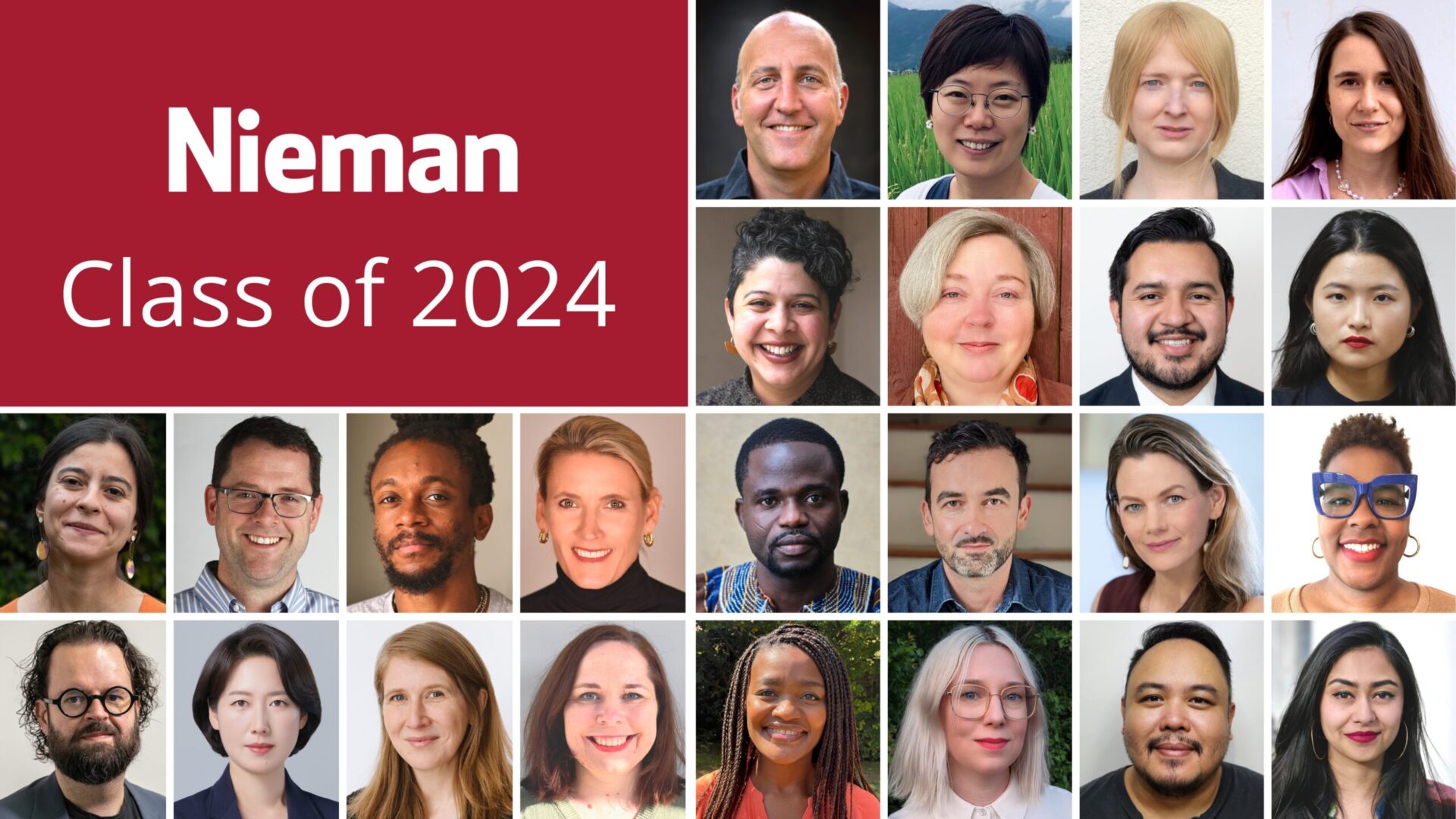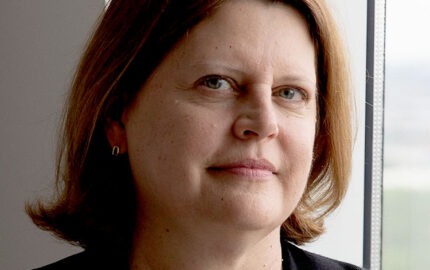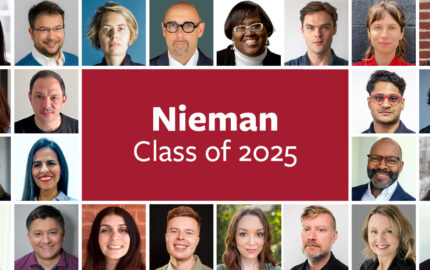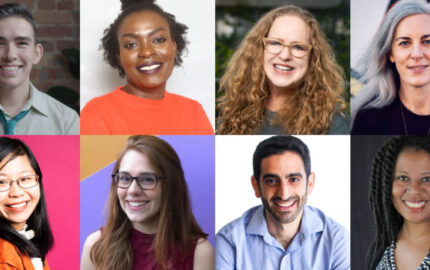The Nieman Foundation for Journalism has selected 24 global journalists for a year of study at Harvard University, where they will work on ambitious projects ranging from the climate crisis to artificial intelligence.
The new cohort is a dynamic reflection of journalism’s rapidly evolving modes of reporting and storytelling. The Nieman class of 2024, which arrives on campus this fall, includes investigative reporters, podcasters, documentary filmmakers, an open-source researcher, writers, video and photojournalists, a film critic, a television news producer, a media analyst and senior editors and newsroom leaders who direct innovative journalism ventures in the U.S. and abroad.
They cover politics, sports, religion, arts and culture, the environment, human rights, abortion, science and deepening rifts in society, among other topics. They work online, in print, on air and in emerging digital spaces.
In two semesters of study at Harvard, the fellows will examine the growing threats to democracy and the free press; the use of AI in reporting; innovations in storytelling; political polarization; trauma; climate destabilization; scientific advances in health care; reporting under repressive regimes; solutions journalism; media trust; and journalism collaboration.
“These inspiring journalists are working to elevate and redefine our industry at a critical moment,” said Ann Marie Lipinski, curator of the Nieman Foundation. “The vast possibilities offered by changing modes of creation and communication invite new approaches to our work, and the severe threats against journalism around the globe demand them. I’m excited to support the research of these fellows as they work to strengthen journalism and contribute to the Harvard community in important ways.”
Since 1938, the Nieman Foundation has selected more than 1,700 journalists from 100 countries for fellowships at Harvard. In addition to taking classes at the university, fellows participate in a robust Nieman program of seminars, workshops, training sessions and collaborations with Harvard scholars, students and leading innovators in the Cambridge area.
The 2024 Nieman Fellows and their study plans
Manasseh Azure Awuni, editor-in-chief of The Fourth Estate, a nonprofit investigative journalism project of the Media Foundation for West Africa in Ghana, will research sustainable funding and managerial models for nonprofit newsrooms in Africa, where press freedom is increasingly threatened.
@Manasseh_Azure
James Barragán, a politics reporter for The Texas Tribune, will study the deterioration of traditional democratic norms in the U.S., such as press access to government officials and proceedings, the impact that has on the availability of reliable information and the dangers posed by those who benefit from the rollbacks.
@James_Barragan
Julia Barton, vice president and executive editor at Pushkin Industries in New York, will study the history of rhetoric, audio and spoken-word forms, from speech writing to sermons to film, with a focus on the cultural history of narrative conventions in the U.S. and the role of radio in movements for social change.
@bartona104
Julian Benbow, a sports reporter at The Boston Globe, will study data science and data visualization to help interpret and present the data fueling sports and sports coverage, as well as parallels between athleticism and art.
@julianbenbow
Elsie Chen, a Chinese reporter based in Shenzhen, China, who has worked as a reporter and researcher for The New York Times in Beijing and Seoul, will study the work of independent journalism within social movements. Immediately following her studies at Harvard, Chen will begin a nine-month reporting fellowship with The Associated Press as part of a new Nieman-AP partnership supported by Schmidt Futures. The goal of the program is to provide journalists with China expertise the chance to sharpen their skills and enhance their coverage of China and U.S.-China policy issues.
@elsiechenyi
Ben Curtis, a photojournalist and East Africa bureau chief for The Associated Press in Kenya, will study mental health issues arising from conflict and other traumatic events, focusing on psychology, neuroscience and PTSD, and the impact of these issues on journalism.
Lebo Diseko, a South African correspondent for the BBC World Service based in London, will study how journalists can adapt to and help protect democracy from the rising threats of post-truth politics, populism and polarization, with a focus on new ways to engage audiences.
@lebo_diseko
Sonya Groysman, a Russian reporter for TV Rain, documentary director and co-host of the podcast “Hello, You’re a Foreign Agent” who works in exile, will study how journalism can help society deal with collective and individual trauma related to war, state repression and polarization.
@SonyaGro
Cristela Guerra, senior arts and culture reporter at WBUR in Boston, will examine stories from the diaspora, including those of her own Panamanian heritage, the reasons that compel people to migrate and how those individuals build community and maintain connections to their cultural identity.
@CristelaGuerra
Denise Hruby, an Austrian environment reporter who writes for The New York Times, The Washington Post and National Geographic, will study how journalists can improve reporting on climate change and biodiversity to better inform solutions to the planet’s problems. She will share her findings in a digital handbook, workshops and a curriculum that will train other journalists and students.
@nisnis
Beandrea July, an independent arts journalist and film critic based in Los Angeles, will study the social impact of the racial empathy gap in movies and on television and the role journalists can play in bridging that gap.
@beandreadotcom
Jikyung Kim, deputy editor, anchor and writer at the Munhwa Broadcasting Corporation (MBC) in South Korea, will examine ethical standards in the digital age for reporting on stories about suffering.
Javier Lafuente, deputy managing editor of the American edition of the Spanish newspaper El País, will study the evolution of new left-wing governments in Latin America, how they differ with those who governed the region during the first decade of the 21st century and their relationship with the media. Lafuente is based in Mexico City.
@lafuentejavi
Yana Lyushnevskaya, a senior journalist with BBC Monitoring’s team in Kyiv, will study how media in conflict-torn countries can transition from war to peace and contribute to creating a post-war media environment that is free, diverse and pluralistic.
@Yana_Lshnvsk
Ilya Marritz, a New York-based reporter who covers threats to democracy for ProPublica and Trump legal matters for NPR, will study the forces that are driving authoritarianism and dis- and misinformation, and putting democracy under strain in diverse societies around the world.
@ilyamarritz
Andrea Patiño Contreras, a video journalist and editor from Colombia who is based in Boston, will study how journalists can create trauma-informed practices when reporting on vulnerable populations, particularly survivors of sexual violence.
@andreapatinoc
Rachel Pulfer, executive director of Journalists for Human Rights in Toronto, will focus on how human rights journalism can inform and improve policymaking in and for developing countries. Pulfer is the 2024 Martin Wise Goodman Canadian Nieman Fellow.
@Rachel_Pulfer
Andrew Ryan, an investigative reporter for The Boston Globe, will study how reinvigorated accountability reporting at the local level could be used to establish fresh footholds in news deserts. This will include examining whether artificial intelligence might help augment local investigative reporting.
@GlobeAndrewRyan
Denise Schrier Cetta, a producer and writer for “60 Minutes” at CBS News, will study how scientific advances in gene editing, longevity and neuroscience are improving health and increasing life expectancy while also threatening to increase inequality between those who have access to new technologies and those who do not.
Surabhi Tandon, an Indian reporter and filmmaker, will research the science and history of impactful storytelling, analyze elements of video journalism that are most resonant and what stories stick in an age of information overload.
@ihbarus
Jaemark Tordecilla, head of digital media at GMA News in the Philippines, will study audience trust in media organizations and what newsrooms can do to strengthen that trust and build engagement.
@jaemark
Sarah Varney, a senior correspondent for KFF Health News based in Massachusetts, will study the journalistic framing and ethics of abortion coverage in the United States, focusing on the intersection of religion, sociology, politics, medicine and gender.
@SarahVarney4
Johanna Wild, a German open-source researcher and founder of the investigative tech team at Bellingcat in Amsterdam, will study how open-source research tools can be collaboratively built, maintained and made accessible to the diverse global researcher community.
@Johanna_Wild
Annie Jieping Zhang, founder and CEO of Matters Lab in Hong Kong and Taiwan, will work on building decentralized support networks for independent journalists who face censorship and political repression.
@AnnieJieping
The fellows were selected by Nieman Foundation curator Ann Marie Lipinski and deputy curator James Geary together with 2016 Nieman Fellow Wonbo Woo, a New York-based journalist and producer; 2022 Nieman Fellow Fu Ting, a journalist with The Associated Press; Corinne Chin, director of news talent for recruitment at the AP; and Ron Nixon, AP’s vice president for news and head of investigations.
The Nieman Foundation for Journalism at Harvard educates leaders in journalism, promotes innovation and elevates the standards of the profession. In addition to its fellowship program, the foundation publishes Nieman Reports, a website and print magazine covering thought leadership in journalism; Nieman Journalism Lab, a website reporting on the future of news, innovation and best practices in the digital media age; and Nieman Storyboard, a website showcasing exceptional narrative journalism and nonfiction storytelling.



